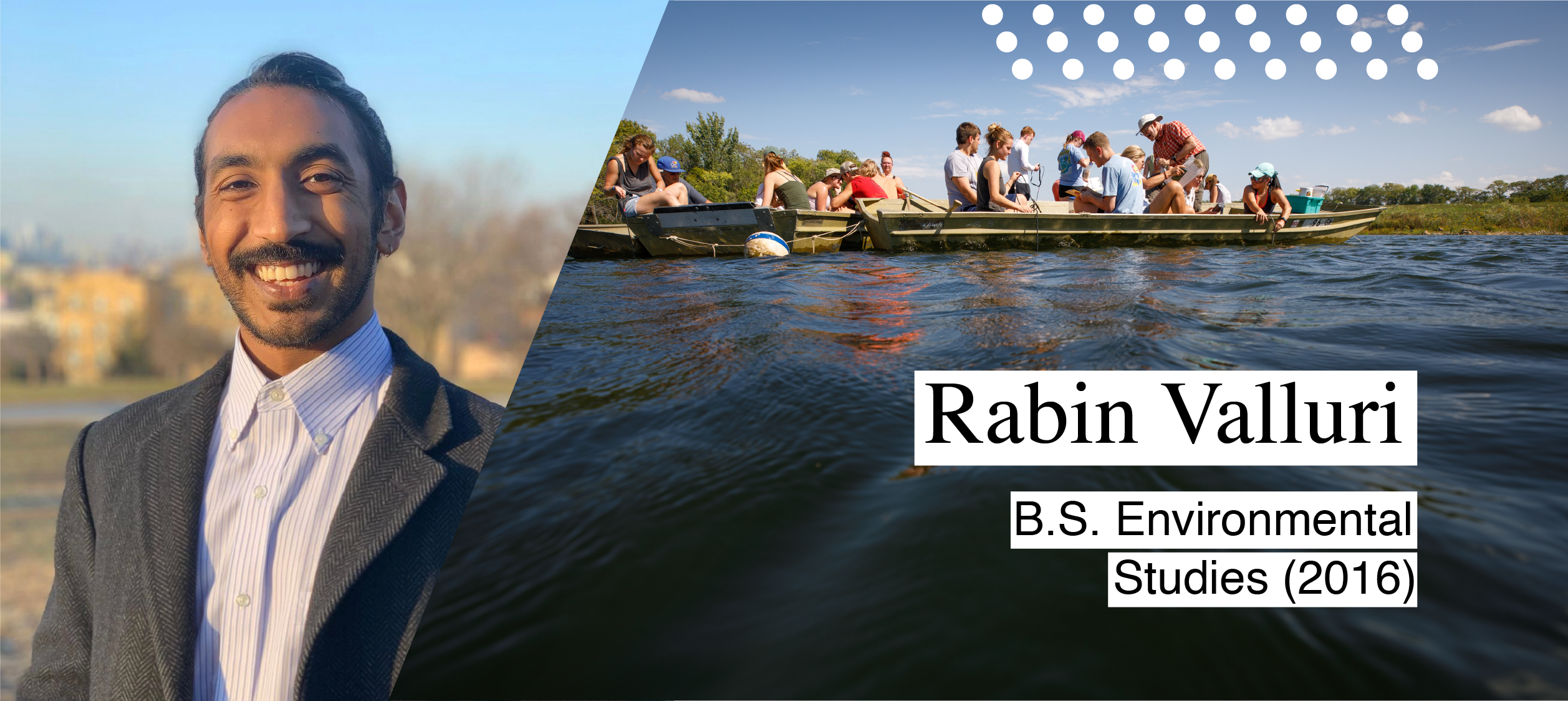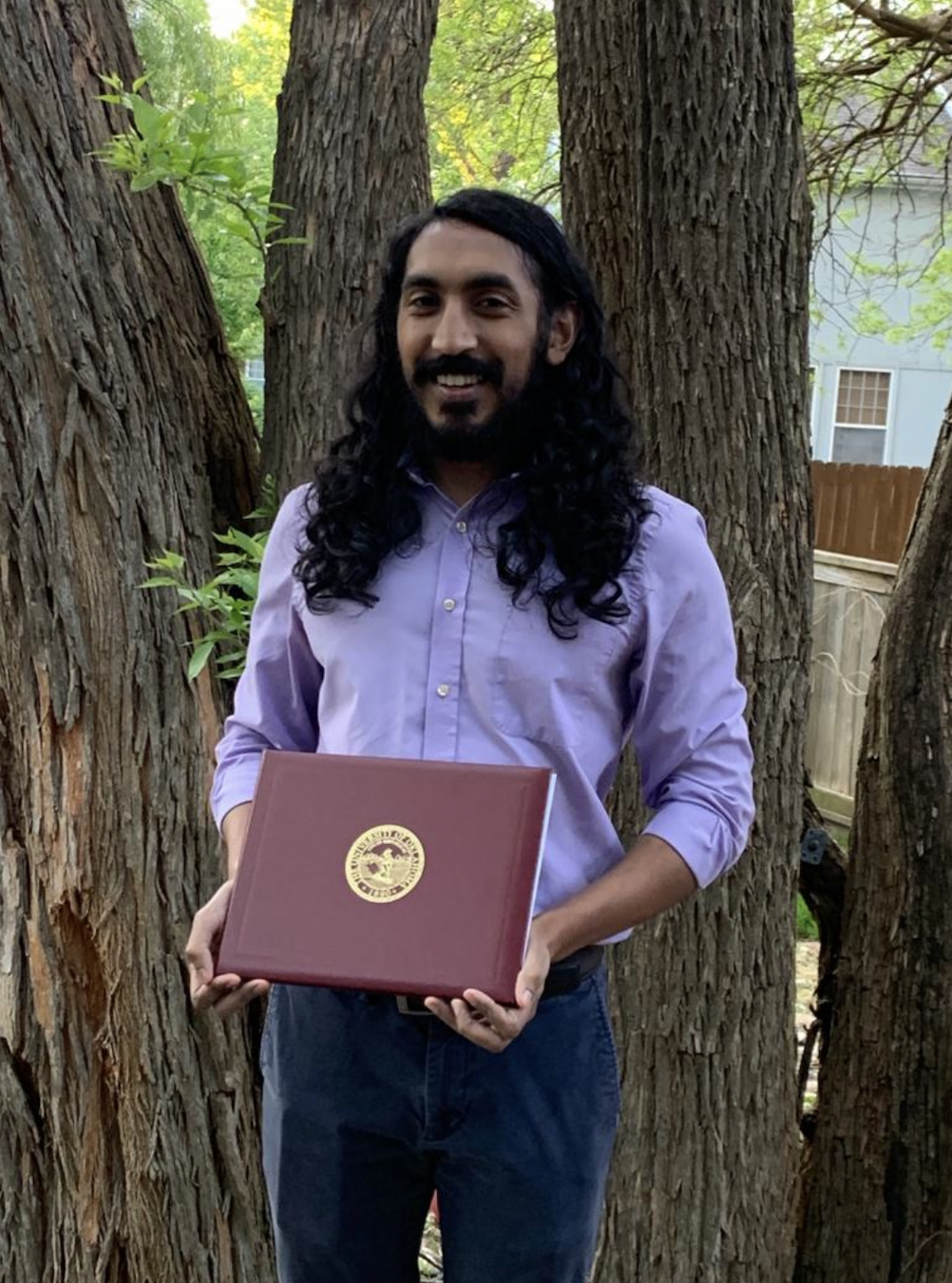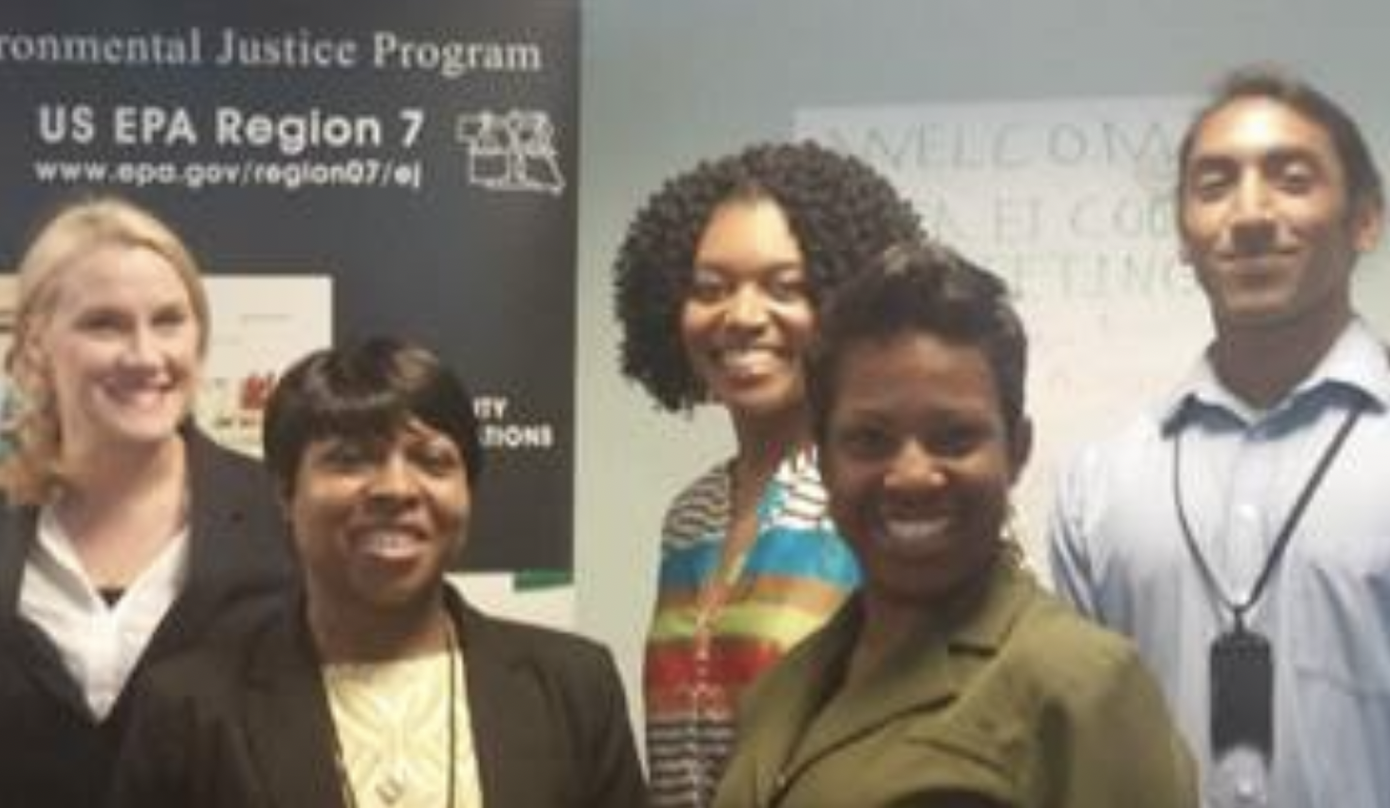
Why Rabin’s a Hawk to Watch:
As the consequences of climate change are felt throughout the United States along with the rest of the world, some people are making it their life’s work to combat its effects. Whether their premiere focus is on water availability, the reduction of greenhouse gas emissions, or the development of more sustainable living practices, these people strive to make Earth a habitable place as long as possible.
Rabin Valluri is one of these people. After achieving a B.S. in Environmental Studies from the College in 2016, Rabin has spent his career working toward a world in which the effects of climate change can be mitigated. From his undergraduate education to his professional life, Rabin has manufactured an impressive path to his current role as a sustainability consultant at the New York-based climate change advisory firm Agendi.
But Rabin’s journey wasn’t completely free of detours. COVID-19, a tumultuous job market, and fruitless job searches added length to the process. However, led by the unwavering belief that “everyone deserves access to clean air and safe water,” Rabin used some clever outside-the-box thinking to get his foot in the door.
Read on to see Rabin’s unique journey since his days in Lawrence, including how he narrowed his career interests, how KU’s Environmental Studies program prepared him for his future, and how he spends his free time in New York, New York, the city so big they named it twice. Discover what makes Rabin a Hawk to Watch.
Tell us in a sentence or two what you do for a living:
I am a austainability consultant with Agendi, a climate change advisory firm. We work with clients across a wide variety of sectors to calculate their greenhouse gas emissions. Once that baseline is calculated we can use that data to set reduction targets, conduct scenario analysis, and assist with ESG reporting and disclosure.
How did you end up doing what you do? Was there a certain moment when things came together, or was it a longer journey?

As much as I wish I had the determination or foresight, a “dream job” was never clear to me. When I was a student in the Environmental Studies program, I spent countless hours turning over the options in my head; ecological restoration, GIS, environmental law, within the environmental space there are an infinite number of specializations, and that breadth can be daunting! The only thing I knew for certain that I wanted was to pursue the same belief that drew me to the environmental field in the first place, the belief that everyone deserves access to clean air and safe water, the most basic foundation for health and well-being. After scattering my resume to the winds in the hopes of manifesting an internship my junior year, I secured a Pathways Internship at the Environmental Protection Agency (EPA) in the Environmental Justice department.

As that internship transitioned into a full-time job, I had the unique opportunity to learn about communities that were being adversely impacted across the country, and what was (or wasn’t) being done for them. It was around this time that the water crisis in Flint, MI began making headline news. It was completely unconscionable that such disparate water quality could exist in such a densely populated area in the US. That dumbfounded anger sparked an interest in water management, which eventually led me to pursuing a Masters in Hydrology and Water Security at the University of Oklahoma.
Following completion of my graduate degree and a move to New York, I worked at a non-profit called the Safe Water Network, an organization which addresses the safe water access gap for rural communities in Ghana and India through field implementation, technical assistance, and sector engagement. I found a lot of personal and professional fulfillment in taking a head on approach to water security, but as I’m sure many can relate to, I was still gripped by climate anxiety. I wanted to address the problem more directly, by working with corporations to reduce the emissions they create. I applied for several consulting jobs in the corporate sustainability space and found a great community of like minded professionals in my colleagues at Agendi.
What do you feel is your biggest achievement so far?

My biggest achievement so far is securing a job in a COVID economy. In March 2020 I was one of the millions of people globally who lost their job due to the COVID-19 pandemic. At that point I was only two months away from completing my master’s degree, which was a fully online program, so I thought a few months of unemployment and focusing full time on school would be a great chance to finish my degree strong, and come graduation the economy would adapt and there would be job postings again. As we know now, the job market did not rebound in the summer of 2020 and I found myself newly accredited and completely adrift.
I spent hundreds of hours on LinkedIn, Indeed, and dozens of industry specific job boards responding to postings and emailing recruiters fruitlessly for any type of work. I began meeting with a mentor who proved to be an amazing thought partner in my job search, helping me narrow down my interests and better target my job hunt.
After several months without work I began to take a new tactic; if I was to be receiving unemployment payment from the state anyway, rather than spending time trying to find a paycheck I should make finding experience a priority and offer to volunteer my time pro-bono to the organizations I was most interested in. As it turns out, organizations were very receptive to this approach, as their workload had not diminished, the COVID landscape had just made finances tight and onboarding more difficult.

I began working with the Safe Water Network in the fall of 2020 on a “low-bono” three-month contract for part-time work. This opportunity mirrored an internship and allowed me to explore the landscape of the work I was passionate about. At the end of this three-month period, both myself and the Safe Water Network were happy with our arrangement, and I began to work with them on a full-time basis with full compensation.
What’s your lowest career moment and how did you pick yourself up and move on?
This ties in very closely with my answer above. So grateful that my lowest career moment lead me towards my greatest accomplishment.
Where do you hope to be in 10 years?

I hope to continue doing mission-driven work while pursuing opportunities that allow me to grow outside of my comfort zone. Ideally this role will still be in the consulting world, but with as rapidly evolving as the sustainability field I’ll keep myself flexible to where the need is. Beyond that, as much as I love my apartment in Brooklyn, in 10 years I sure do hope to be in a place with a backyard again.
What do you know now that you wish you could tell your 18-year-old self?
Success is not linear. The idea of going to college, getting a job, and climbing the ladder is not the path for everyone. There is no shame in moving laterally, finding out that a position might not be what you thought it was, or that your calling lies in a completely different field. Don’t be afraid to pivot your career, it might look uncomfortable on paper to take a different job or try your hand in a role that you didn’t go to school for, but there are plenty of ways to land on your feet and leverage your experience.
What’s your best career pro-tip?

Finding job satisfaction can greatly improve your quality of life and collectively boost the morale of the people you work with. Confidently communicate areas of interest and career goals with your manager and see if there is any way you can collaborate across teams or across projects to take on additional work outside of your job description. Your job does not have to be exclusively what is listed in the posting.
How did your KU degree prepare you for your current job?
The KU Environmental Studies program explored the depth and enormity of the environmental field. Environmental science has a component in nearly every industry, and only increasingly so as the effects of climate change become more prominent. The professors at KU took care to show the many avenues a career in the environment can take.
What do you do after you’ve clocked out?
As any good environmental professional should, I try to spend as much time outdoors as possible. Whether that’s walking my dog, riding my bike, or birdwatching in Prospect Park, I’m always eager to get out of the house!
What is a fun fact about you that surprises people?
In the days before COVID I was an actively performing musician, usually spending my weeknights practicing and my weekends on tour drumming for various punk bands. It was sometimes a lot to clock out of work and immediately drive to a gig a few hours away, but with enough determination (and a medically inadvisable amount of coffee) anything is possible!
Meet more of our Hawks to Watch. For more information, check out the Environmental Studies Program at the University of Kansas. Check out the Lawrence Arts Center here.